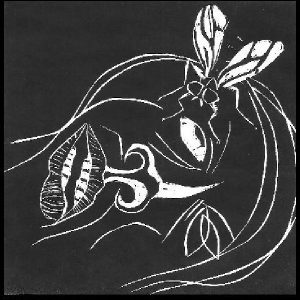Dumuzi was taken captive in Uruk.
He will no longer bathe in Eridu.
He will no longer soap himself at the holy shrine. . .
He will no longer perform his sweet task among the maidens of the city.”1
Evidently his “job” was not only to satisfy Inanna’s lusty appetite. He also was charged with initiating young girls into the mysteries of sex.
Here is Dumuzi’s mother Sirtur mourning the death of her son:
“The ewe gives up her lamb.
The goat gives up her kid.
My heart plays the reed pipe of mourning.
I would go to him,
I would see my child.”The mother walked to the desolate place.
Sirtur walked to where Dumuzi lay.
She looked at the slain wild bull.
She looked into his face. She said:
“My child, the face is yours.
The spirit has fled.”There is mourning in the house.
There is grief in the inner chambers.2

1164 CE fresco from Church of St. Panteleimon in Macedonia
For me, this is one of the more evocative passages in the poem – a pre-Christian pieta in which a mother beholds her dead son. But it wasn’t till after I had made the print that I connected Dumuzi with the crucified Christ (also a “Good Shepherd”). During the design process, I was thinking about Sirtur’s pain. She knows that sheep and goats give up their young as part of the natural order of husbandry, but her son was grown – a wild bull cut down in his prime. She looks at his bruised, dead face, one eye swollen closed, and retreats to the “inner chambers” of her house. Her grief strikes me as wise.
As for Inanna, she has forgotten her quarrel with Dumuzi. She feels no guilt for having caused his death. She remembers only the early bliss of their marriage. “Gone is my husband, my sweet husband,” she cries. “Gone is my love, my sweet love.”
My beloved has been taken from the city.
O, you flies of the steppe,
My beloved bridegroom has been taken from me
Before I could wrap him with a proper shroud. . .I ask the hills and valleys:
‘Where is my husband?’
I say to them:
‘I can no longer bring him food.
I can no longer serve him drink.’The jackal lies down in his bed.
The raven dwells in his sheepfold.
You ask me about his reed pipe?
The wind must play it for him.
You ask me about his sweet songs?
The wind must them for him.’”3

2599-2300 BCE, from American/British dig, 1927-28 season.
For my print, I imagined Inanna mourning in Mesopotamian fashion: she has shorn off her abundant hair and clawed at her face with her nails. I don’t know if a Sumerian woman in mourning would have worn jewelry. Nonetheless, I couldn’t resist borrowing some for Inanna – a carnelian-lapis cuff and a gold wreath excavated from Queen Pubai’s tomb in Ur.
At first reading, Inanna’s lament puzzled me. Why was she distressed about Dumuzi’s food and drink? It seemed out of character: the warrior-goddess as a nurturing “little woman”? But after some googling, I learned that food and drink were a significant part of Sumerian funeral rites. Dumuzi should have been buried in a royal tomb with a generous supply of food and drink, as well as his reed pipe and other possessions to enjoy in the Underworld. To care for his needs, a retinue of servants and fellow musicians might have been sacrificed and buried with him.4
As it was, however, only ravens and jackals lay beside his dead body. Inanna worried that without a proper funeral, Dumuzi’s spirit would return as an angry, hungry ghost to wreak havoc on her lands. Fortunately, a “holy fly” saved the day. It buzzed insistently around Inanna’s head and inquired: “If I tell you where Dumuzi is, what will you give me?”
Inanna said:
“If you tell me,
I will let you frequent the beer-houses and taverns.
I will let you dwell among the talk of the wise ones.
I will let you dwell among the songs of the minstrels.”5
So the fly was persuaded. It revealed where Dumuzi lay and, accompanied by his beloved sister Geshtinanna, Inanna set out to find him.
1 Wokstein and Kramer, Inanna, Queen of Heaven and Earth, Harper Row, 1983, p. 85
2 Ibid. p. 87
3 Ibid. p.86
4 In the tombs at Ur, excavated in the 1920s by British archaeologist Sir Leonard Woolley, 73 bodies of ritually sacrificed “attendants” were found with the remains of royal individuals.
5 Wolkstein and Kramer, Op Cit. p. 88

